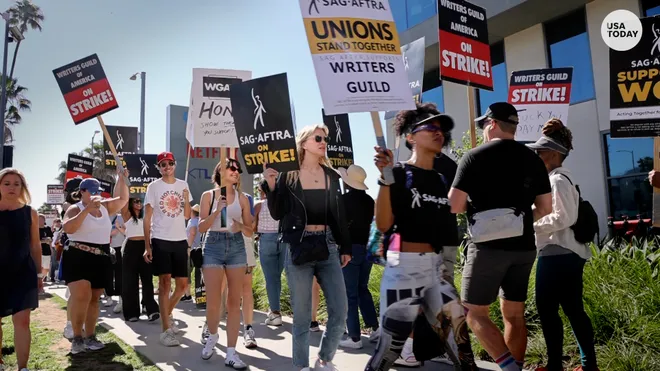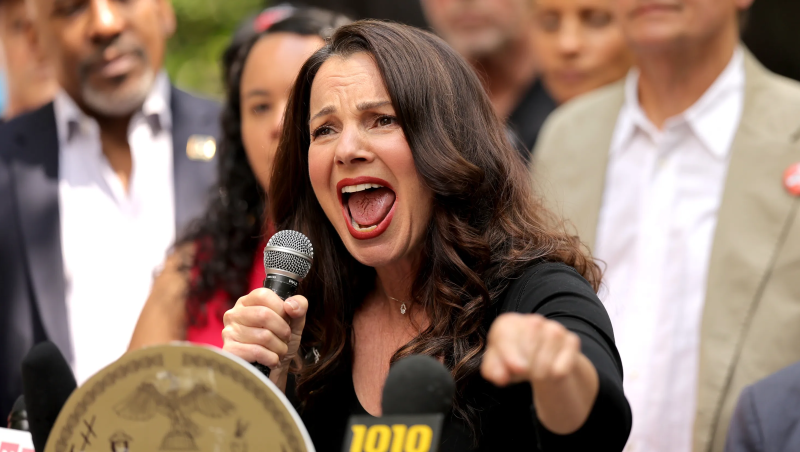Exclusive: Survey says movie and TV fans side with striking actors and writers
Fans are ready to strike right alongside writers and actors.
At least, that's according to results of a new survey by Horizon Media's WHY Group, which USA TODAY can exclusively reveal. The media agency polled 600 consumers about the current Screen Actors Guild and Writers Guild of America strikes, and analyzed more than one million social media posts about the labor actions for a study called "The Tipping Point."
Their findings: Not only were more than half of respondents aware of the strikes, but but 73% of people who knew about them were invested in following the story. Of those, 45% took the side of the writers and 39% took the side of the actors. (Studios, networks and streaming services only garnered single-digit support from respondents, with 9%, 8% and 9%, respectively).

"It is very clear that people are aware of what's happening and how it's going to affect them. I think that's the biggest difference we've seen" compared to other strikes, says Maxine Gurevich, senior VP of cultural intelligence at Horizon WHY. She attributed the higher support for writers to the public's perception that most actors are rich and famous. "They can't get past the fact that these top celebrities get paid so much," she says, although in reality 86% of SAG-AFTRA's membership makes less than $26,000 a year.
In addition to sympathizing with the picketing writers and actors, Horizon found that consumers were willing to wait for their favorite movies and TV shows to return until the strike is over. "Most people are making alternate content choices as they wait for the strikes to resolve and say they will rewatch old shows (47%); find shows/movies on other streaming platforms they subscribe to (35%); spend more time on other non-entertainment hobbies (28%); and try new genres of entertainment (25%)," the survey revealed.
"Pretty much everyone understood that they were going to have to watch reruns and reality TV," Gurevich says. Yet "there's only so much reality TV that people want to watch."
The WGA has been striking for three months and SAG-AFTRA for three weeks with little progress made. The sides are far apart on the details of the contract, and no new talks between SAG-AFTRA and the Alliance of Motion Picture and Television Producers (AMPTP), which bargains on behalf of the studios, have been scheduled. The WGA told its membership Tuesday night that they would meet with representatives from the AMPTP Aug. 4 to discuss restarting negotiations, a potential sign of movement. The double strike, the first in Hollywood since 1960, has stopped virtually all scripted film and TV production in the United States and in many places around the world. High-profile series like ABC's "Abbott Elementary" and Netflix's "Stranger Things" have ceased or been prevented from starting to film new seasons. Movies like "Mission: Impossible – Dead Reckoning Part Two" have stopped filming. Other completed films are being delayed because actors and writers can't promote them.
Horizon found that viewers are concerned about the rising cost of streaming services: Just 28% (but 38% of those who support the strikers) would be willing to pay more if it helped to meet the demands of actors and writers. Younger viewers were much more likely to pay more than older ones.
The biggest threat to the entertainment conglomerates, according to this data, is that young consumers will cancel their streaming subscriptions in favor of TikTok entertainment. "Among 18-to-25 year-olds, 55% said they're going to watch more YouTube and go to social platforms," Gurevich says. "If these strikes persist, it's a longer amount of time they're going to be hooked to their algorithms."
Can AI really replace actors?It already has.

Disclaimer: The copyright of this article belongs to the original author. Reposting this article is solely for the purpose of information dissemination and does not constitute any investment advice. If there is any infringement, please contact us immediately. We will make corrections or deletions as necessary. Thank you.







